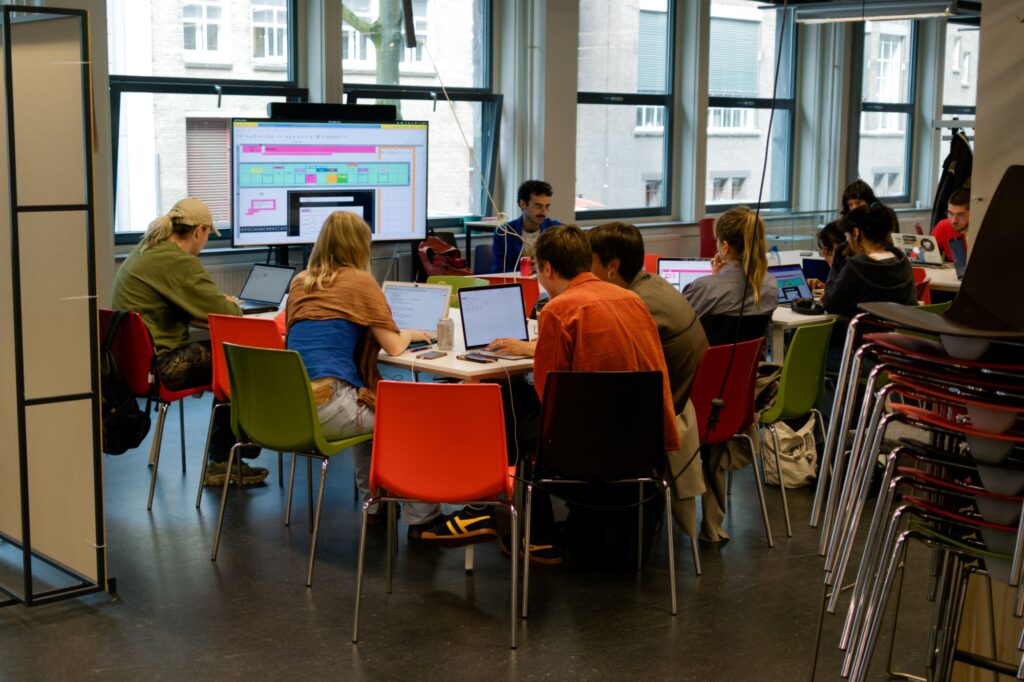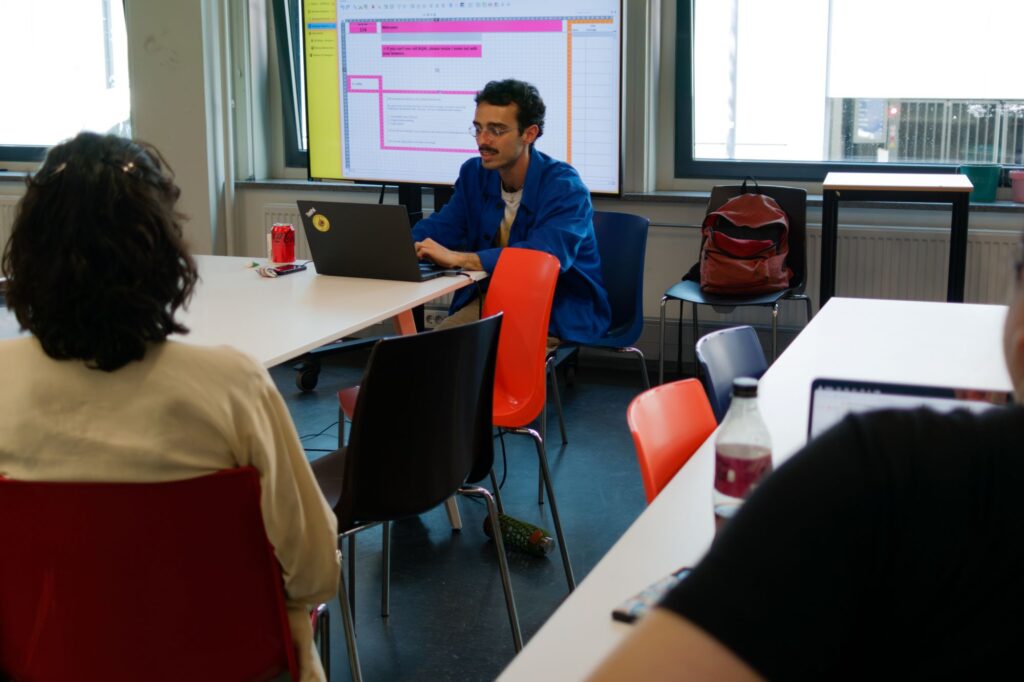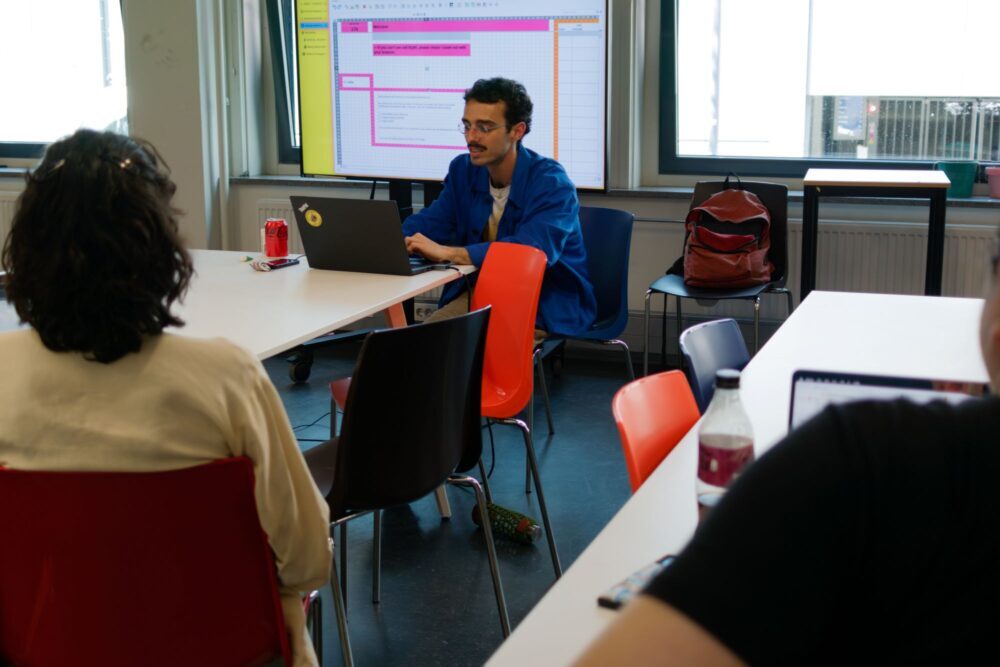| Date | 05/23/2023 |
| Time | |
| Location | WdKA |
| Researchers | |
| Affiliated research project |
|
Workshop held with students of the WdKA Autonomous Practices and their tutor, Alice Strete.
Karl Moubarak works with art, culture, and software and computers. He rarely works alone, but rather in groups, networks and collaborations. These include the Office of Queer Affairs, Cell for Digital Discomfort and Hackers & Designers.
Office of Queer Affairs
The Office of Queer Affairs started as a group of volunteers at the Van Abbe Museum Eindhoven, while Karl was a student at the Design Academy Eindhoven. It was founded as a queer book reading group but morphed into a group for discussing media from a queer perspective. The group took part in the museum’s ‘Drag-it-up’ drag events, which were a first for the institution and sometimes confronting for the local audience.
All this work was done on the basis of a voluntary payment of 50 euros per month. Ultimately, this – i.e. putting the burden of queering on the volunteers – was considered unacceptable by the group members. After protesting, the museum improved pay and included the Office of Queer Affairs in curatorial meetings about the collection exhibition.
The collective initiated the project, ‘Love Letters Tour’; an audio tour of twelve artworks in the collections that the Office of Queer Affairs loved and wanted to talk about. Using invitations in the style of personalized dating ads, museum visitors could submit their own love letters as voice messages to a telephone number. The collected love letters would amount to a queer audio tour of the museum.
Cell for Digital Discomfort
This project was made for BAK Utrecht with the concept of using discomfort as a productive force, based on Sarah Ahmed’s theory of discomfort. Digital discomfort included discomfort with existing proprietary systems and internet platforms, and the use of open-source tools instead.
The project included published essays by Marloes de Valk and Ramon Amaro, among others, and the collaborative writing of a “Wishlist for Trans-Feminist Servers” based on the (older) Feminist Server Manifesto by Femke Snelting and others. The latter was an attempt to critically comment on the original document and collaboratively rewrite it in a workshop through the lens of decolonial and trans culture.

Hackers & Designers
At documenta fifteen, the Hackers & Designers collective ran a workshop on zine publishing, using their self-developed tool ‘ChattyPub’. ChattyPub is based on the team collaboration software Zulip and turns it into a tool for collaboratively writing, designing and printing publications of all kinds, including books and zines. The documenta fifteen zine was created in collaboration with visitors – mostly older people from Kassel – and focused on the political controversies surrounding documenta fifteen, allowing visitors to share their feelings, comments and observations.
Takeaways on Autonomy
Autonomy in relation to societal dependencies
Autonomy has been an interesting concept particularly in the context of squatting. There is now a discrepancy between the older, legalized and economically settled squatters and the younger, more economically precarious generation of squatters: How can one, as a squatter, claim autonomy when one has multiple dependencies on public infrastructures, such as social security (healthcare, etc.)?
This question also relates to the collectives in which Karl was involved: The Office of Queer Affairs was both autonomous and dependent on an institution (of the Van Abbe Museum Eindhoven). Hackers & Designers is both autonomous and dependent on the Stimuleringsfonds Creatieve Industrie as its main source of funding. The practice of the collective stretches what is allowed and expected within the cultural funding system, but ultimately has to exist within that system.
In the Netherlands, arts and culture are a public service. This means your work is funded by taxpayers’ money and you must report and justify your practice as a public service. This can be problematic because you always have to end on a positive note: you have to create joy, you are not allowed to be angry. After all, culture as a public service is meant for a nuclear, middle-class, suburban Dutch household. The only other model is the private market art world.
So, autonomy is contested, and the question is, who can afford to be autonomous. We often want to call ourselves autonomous, but we must constantly justify our practice.

